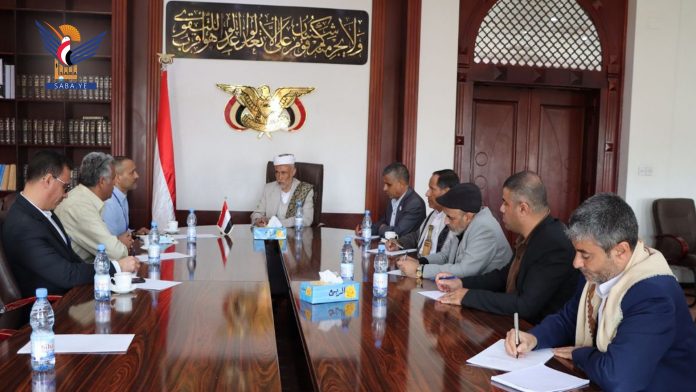Head of the Supreme Judicial Council Judge Ahmed al-Mutawakel met on Sunday with Deputy Resident Representative of the Office of the High Commissioner for Human Rights Safir Al-Din Sayed.
During the meeting, which was attended by the Acting Minister of Human Rights Ali al-Dailami, discussed issues related to the enhancing and protecting human rights and the role of the judiciary within the framework of the laws in force.
The meeting reviewed the efforts of the judiciary, the modernization and amendment of some laws to facilitate litigation for citizens, defend basic rights and public freedoms, issues of prisoners, and combat human trafficking.
Al-Mutawakel stressed that Yemeni legislation and laws are among the best legislation that preserves human rights, and represent the impenetrable bulwark for the protection of rights, as they are derived from Islamic Sharia.
He pointed to the Revolution leader’s keenness to achieve justice, and his attention to the judicial, human rights aspects, as well as address the shortcomings in some procedural legal articles in a way that speeds up and brings justice closer to citizens.
Judge Al-Mutawakel confirmed that the Public Prosecution and the Judicial Inspection Authority are currently working in the field to follow up the cases of prisoners, indicating that a large number of prisoners have been released and work is still continuing to release everyone who deserves release in accordance with the law.
He touched on the difficulties faced by the judiciary in the matter of foreign prisoners sentenced in drug cases, pointing out that the judiciary needs the help of the Commission to arrange the situation with their countries so that they can serve their sentences in their countries.
For his part, Sayed considered the meeting with the judiciary leadership as an important factor that helps to promote human rights and to understand the procedures that have been taken, especially with regard to amending some laws and legislation related to rights, crimes and penalties, considering the judiciary the top of the pyramid in the implementation and promotion of human rights principles.
He pointed to the importance of applying human rights standards, stressing that the work of the Office of the High Commissioner is consistent with humanitarian aspects, and is in line with international treaties, and the work of international committees working in the field of human rights.
The meeting stressed that, during the years of aggression, the Yemeni people lacked the most basic rights, the most important of which is the right to life, pointing out the need for the Commission to highlight the crimes of aggression and its violations of human rights, foremost of which is the right to life, food, drink, treatment and health, especially the rights of children and women.
It touched on the suffering of the Yemeni people due to the aggression and the weak role of humanitarian organizations in conveying the facts, especially children, women, patients and civilians; moreover, preventing the entry of food and medicine ships and the detention of fuel ships.



















